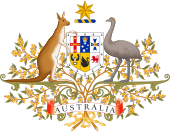
George Henry Brandis is an Australian former politician. He was a Senator for Queensland from 2000 to 2018, representing the Liberal Party, and was a cabinet minister in the Abbott and Turnbull governments. He was later High Commissioner to the United Kingdom from 2018 to 2022.

The Australian Human Rights Commission is the national human rights institution of the Commonwealth of Australia, established in 1986 as the Human Rights and Equal Opportunity Commission (HREOC) and renamed in 2008. It is a statutory body funded by, but operating independently of, the Australian Government. It is responsible for investigating alleged infringements of Australia's anti-discrimination legislation in relation to federal agencies.

The second question of the 1967 Australian referendum of 27 May 1967, called by the Holt government, related to Indigenous Australians. Voters were asked whether to give the Commonwealth Parliament the power to make special laws for Indigenous Australians, and whether Indigenous Australians should be included in official population counts for constitutional purposes. The term "the Aboriginal Race" was used in the question.
Human rights in Australia have largely been developed by the democratically elected Australian Parliament through laws in specific contexts and safeguarded by such institutions as the independent judiciary and the High Court, which implement common law, the Australian Constitution, and various other laws of Australia and its states and territories. Australia also has an independent statutory human rights body, the Australian Human Rights Commission, which investigates and conciliates complaints, and more generally promotes human rights through education, discussion and reporting.

Electronic Frontiers Australia Inc. (EFA) is a non-profit Australian national non-government organisation representing Internet users concerned with online liberties and rights. It has been vocal on the issue of Internet censorship in Australia.
The Adelaide Institute was a Holocaust denial group in Australia and is considered to be antisemitic by the Australian Human Rights Commission and others. The Adelaide Institute was formed in 1995 from the former Truth Mission that was established in 1994 by Fredrick Töben, later a convicted Holocaust denier. Töben directed the Institute until his incarceration in 2009 in South Australia for contempt of court. Peter Hartung assumed the role of director of the Adelaide Institute. On assuming the role from Töben, Hartung defied the Federal Court by publishing the revisionist material that led to Töben's three months jail time. In June 2009, the Adelaide Institute was linked with an American white supremacist, James von Brunn, charged with killing a security guard in Washington's Holocaust Museum.

Mabo v Queensland , was a significant court case decided in the High Court of Australia on 8 December 1988. It found that the Queensland Coast Islands Declaratory Act 1985, which attempted to retrospectively abolish native title rights, was not valid according to the Racial Discrimination Act 1975.
Louis Beers was an Australian comedian who performed under the stage name King Billy Cokebottle. He attracted controversy at his performances by wearing blackface to impersonate an Aboriginal Australian. Beers was born in Holland and his family migrated to Australia when he was 3 years old, where he grew up in the Perth suburb of Riverton in Western Australia. He began performing as King Billy on Perth radio in the 1970s and moved to Townsville, Queensland in the early 1990s. Changing attitudes towards the use of blackface and towards racism in Australia led Beers to receive less work in his later years. Despite the contents of his performance, Beers denied allegations of racism and claimed to have Aboriginal family members.

Alas Poor Yagan is an editorial cartoon created by Dean Alston and published in the Australian newspaper The West Australian on 6 September 1997. The cartoon, consisting of eight panels featuring Noongar activist Ken Colbung and three Indigenous Australian children, sparked controversy due to its content, leading to a racial discrimination complaint lodged with the Human Rights and Equal Opportunity Commission. The commission ruled that while the cartoon made inappropriate references to Noongar beliefs, it did not violate the Racial Discrimination Act 1975. The commission's ruling, which found the cartoon to be an "artistic work" published "reasonably and in good faith", has been the subject of academic debate, with some commentators expressing concern about the broad interpretation of the exemption provided under the Racial Discrimination Act. This decision was upheld upon appeal to the Federal Court of Australia.

The Native Title Act 1993(Cth) is an act of the Australian Parliament, the purpose of which is "to provide a national system for the recognition and protection of native title and for its co-existence with the national land management system". The Act was passed by the Keating government following the High Court's decision in Mabo v Queensland (No 2) (1992). The Act commenced operation on 1 January 1994.
Gerald Fredrick Töben was a German-born Australian citizen who was director and founder of the Adelaide Institute, a Holocaust denial group in Australia. He was the author of works on education, political science, and history.

In Kruger v Commonwealth, decided in 1997, also known as the Stolen Generation Case, the High Court of Australia rejected a challenge to the validity of legislation applying in the Northern Territory between 1918 and 1957 which authorised the removal of Aboriginal children from their families. The majority of the bench found that the Aboriginals Ordinance 1918 was beneficial in intent and had neither the purpose of genocide nor that of restricting the practice of religion. The High Court unanimously held there was no separate action for a breach of any constitutional right.

Gillian Doreen Triggs is a public international lawyer, practicing in human rights, international, commercial and trade law. In 2019, she was appointed by United Nations Secretary-General António Guterres as Assistant Secretary-General of the United Nations. In this capacity, she served until December 2023 as the Assistant High Commissioner for Protection in the team of the United Nations High Commissioner for Refugees Filippo Grandi.

Brandy v Human Rights and Equal Opportunity Commission (HREOC) was a case before the High Court of Australia determining that the HREOC could not validly exercise judicial power. The High Court maintained a firm position against attempts to confer judicial powers upon non-judicial bodies.

Silberberg v The Builders Collective of Australia Inc, is a 2007 judgment of the Federal Court of Australia, and the first Australian case exploring the liability of Internet forum operators for racial vilification under the Racial Discrimination Act 1975.
The hate speech laws in Australia give redress to someone who is the victim of discrimination, vilification or injury on grounds that differ from one jurisdiction to another. All Australian jurisdictions give redress when a person is victimised on account of skin colour, ethnicity, national origin or race. Some jurisdictions also give redress when a person is victimised on account of religion, disability, gender identity, HIV/AIDS status or sexual orientation.
Section 18C of the Racial Discrimination Act 1975, deals with offensive behaviour "because of race, colour or national or ethnic origin" in Australia. It is a section of the Racial Discrimination Act 1975, which was passed by the Australian Parliament during the term of the Whitlam government and makes racial discrimination unlawful in Australia. Section 18C was added by the Keating government in 1995. The Section has been controversial and subject to much debate.

Eatock v Bolt was a 2011 decision of the Federal Court of Australia which held that two articles written by columnist and commentator Andrew Bolt and published in The Herald Sun newspaper had contravened section 18C, of the Racial Discrimination Act 1975 (Cth) (RDA). The case was controversial and instigated community debate about freedom of speech.

Wotton v Queensland is a class action lawsuit brought against the State of Queensland and the Commissioner of the Queensland Police Service on behalf of 447 Aboriginal Australians and Torres Strait Islanders who live on Palm Island in Queensland, Australia.
Michael Jarrett is a Judge of the Federal Circuit and Family Court of Australia. He was previously a Judge of the Federal Circuit Court of Australia until its merger with the Family Court of Australia. Before then, he was a Federal Magistrate of the Federal Magistrates Court of Australia, before it was named the Federal Circuit Court of Australia. Jarrett has presided over a variety of cases, including family law, administrative law, bankruptcy, copyright, human rights, industrial law, and trade practices. Prior to being a judge, Jarrett was a barrister.







